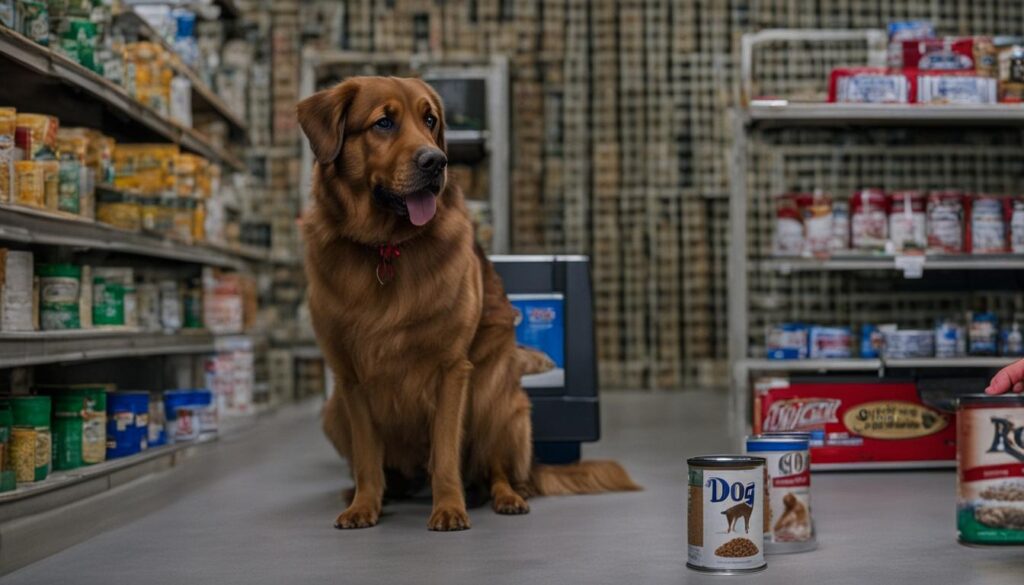Hello, fellow dog lovers! As our furry companions age, it’s important for us to provide them with the care and support they need to thrive in their golden years. Just like humans, senior dogs require special attention to maintain their health and well-being. In this friendly guide, we will explore old dog syndrome, senior dog health, and the best practices for senior dog care.
Key Takeaways:
- Old dog syndrome is a stage of life that both pets and owners must navigate.
- Veterinary behaviorists like Nicholas Dodman provide expert advice on keeping aging dogs healthy and comfortable.
- Basic needs for older dogs include temperature regulation and moderate exercise.
- End-of-life care decisions should consider factors such as the dog’s quality of life and potential treatment costs.
- Regular wellness exams, weight management, and dental care are crucial for senior dogs.
Basic Needs Of Older Dogs
Aging dogs require special care and attention to ensure their well-being and comfort. As our furry friends grow older, it is crucial to address their changing needs and provide a safe and nurturing environment. In this section, I will discuss the basic needs of older dogs and provide valuable tips for geriatric dog care.
Temperature Regulation
Older dogs are more sensitive to extreme temperature changes, so it is important to provide them with appropriate insulation. Avoid leaving them out for extended periods in extreme weather conditions. Additionally, consider providing warm blankets or doggy sweaters during colder months to keep them cozy and comfortable.
Moderated Exercise
As dogs age, their heart and lung function deteriorate. It is crucial to moderate their exercise routine to prevent overexertion or injury. Shorter, more frequent walks or gentle play sessions are ideal for older dogs. However, always consult with a veterinarian to determine the appropriate level of exercise for your aging companion.
Nutrition and Diet
When it comes to feeding older dogs, it is important to consult with a veterinarian. While there are dog foods labeled as “senior diet,” there are no legal requirements or definitions for such food. A vet can provide guidance on the right nutrition for your senior dog, taking into account their specific health needs and any dietary restrictions. It is also important to monitor your dog’s weight and adjust their diet accordingly to maintain a healthy body condition.
By understanding and fulfilling the basic needs of older dogs, we can ensure their comfort and enhance their quality of life. Providing a suitable living environment, moderating exercise, and ensuring proper nutrition are essential elements of geriatric dog care.
End-Of-Life Care for Older Dogs
When our beloved senior dogs are diagnosed with terminal diseases, it becomes a difficult decision for us as owners to determine the best course of action. We face the dilemma of whether to pursue aggressive treatment or prioritize our dog’s quality of life. Considerations such as the cost of treatment, pain levels, and potential extension of our dog’s life must be weighed carefully.
As dogs age, they may also develop canine cognitive dysfunction, which is similar to Alzheimer’s in humans. It’s important to monitor our senior dogs for behavioral changes that could indicate cognitive dysfunction. If we notice an increase in signs over time, it is advisable to seek guidance and support from veterinary professionals.
End-of-life care for older dogs requires us to make compassionate decisions based on what is best for our furry companions. It is an emotional and challenging process, but by navigating it with sensitivity and seeking veterinary guidance, we can provide comfort and support during this difficult time.
Understanding the Decision-Making Process
The decision to pursue aggressive treatment or focus on quality of life depends on various factors unique to each dog and their specific situation. Factors such as age, overall health, prognosis, and the impact of potential treatments on the dog’s daily life must all be considered. Consulting with a veterinarian who understands the complexities of managing old dog syndrome can offer valuable insights and guidance.
Monitoring Behavioral Changes
Our senior dogs may experience changes in behavior as they age. These changes can include confusion, disorientation, increased restlessness, and altered sleep patterns. It is crucial to monitor these behavioral changes closely and document them. This information will be valuable for our veterinarian in assessing our dog’s condition and recommending appropriate care measures.
Ensuring Comfort and Quality of Life
Ultimately, the goal of end-of-life care for older dogs is to ensure their comfort and quality of life. This may involve managing pain through medication, providing a peaceful and stress-free environment, and offering extra support and attention. Each dog’s needs are unique, and it is important to work closely with our veterinarian to create a personalized care plan that meets our dog’s specific requirements.
Knowing When Your Dog is Considered “Senior”
As a dog owner, it’s important to be aware of when your furry friend transitions into their senior years. While the exact age at which a dog becomes a senior can vary based on their size, it generally falls between 7 and 10 years old. This is an important milestone in their lives, as it signifies a time when their needs may change and they may be more susceptible to certain health issues.
One of the key signs that your dog is entering their senior years is the onset of old dog syndrome. This term encompasses a range of age-related conditions and diseases that can affect older dogs. Some common signs of old dog syndrome include arthritis, deafness, kidney disease, cognitive disorders, prostate disease, intestinal problems, dental disease, diabetes mellitus, cancer, liver disease, and vision problems.
Recognizing the signs of old dog syndrome is crucial for providing the appropriate care and attention that your aging dog needs. By understanding these signs and being proactive in seeking veterinary care, you can help manage their health and maintain their quality of life as they enter their golden years.

What Can You Do to Care for Your Senior Dog?
Once you identify that your dog has entered their senior years and may be experiencing symptoms of old dog syndrome, it’s essential to provide them with the necessary care and support. This includes regular visits to the veterinarian for check-ups and screenings, monitoring their health at home for any changes or abnormalities, and adjusting their diet and exercise routine to accommodate their aging body.
Caring for an older dog can also involve making environmental modifications to ensure their comfort and safety. This can include providing a warm and dry living space, incorporating ramps or stairs to help with mobility issues, and investing in orthopedic beds to alleviate joint pain. Additionally, maintaining good dental hygiene through regular brushing and professional cleanings can help prevent further health problems.
By staying vigilant and proactive in caring for your senior dog, you can help improve their overall well-being and ensure they enjoy their golden years to the fullest.
The Importance of Regular Wellness Exams for Senior Dogs
As our loyal canine companions enter their golden years, it becomes increasingly crucial to prioritize their health and well-being. One of the key aspects of senior dog care is scheduling regular wellness exams with a trusted veterinarian. These exams play a vital role in assessing the overall health of senior dogs, detecting any potential illnesses at an early stage, and identifying potential health risks that may require immediate attention.
During a wellness exam, the veterinarian will conduct a thorough assessment of the dog’s health. They will check for any tumors, signs of pain, and arthritis, which commonly affect senior dogs. Baseline laboratory tests, such as blood pressure, urine analysis, blood tests, heartworm tests, and fecal tests, may also be conducted to obtain a comprehensive understanding of the dog’s health status. These tests help the veterinarian monitor the dog’s health and identify any developing trends or health issues that require intervention.
Importance of Monitoring Senior Dogs’ Health
While regular wellness exams are essential, it is equally important for dog owners to actively monitor their senior dogs’ health between vet visits. Being vigilant for any signs of changes in behavior, appetite, water intake, weight, coughing, weakness, lumps, aggression, or any other unusual symptoms can greatly contribute to early detection and prompt treatment of potential health concerns. Any concerning signs or symptoms observed should be promptly reported to the veterinarian for further evaluation and guidance.
By prioritizing regular wellness exams and actively monitoring our senior dogs’ health, we take proactive steps to ensure their continued well-being and provide them with the care they deserve in their golden years. Regular checkups and vigilant monitoring allow us to detect and address any health issues early on, enabling us to provide the necessary interventions and support for our beloved senior companions.
Monitoring Your Senior Dog’s Health
As our beloved furry companions enter their golden years, it becomes crucial for us to actively monitor their health and well-being. Senior dogs are more prone to age-related health issues, and by staying vigilant, we can ensure early detection and prompt treatment. Here are some key signs to watch out for:
Changes in Behavior
If your senior dog starts displaying sudden behavioral changes, such as increased aggression, disorientation, or anxiety, it could be an indication of old dog syndrome. These changes may be caused by conditions like canine cognitive dysfunction or pain due to arthritis or other underlying health issues.
Physical Symptoms
Keep an eye out for any physical symptoms that may arise in your senior dog. This includes increased vocalization, changes in appetite or water intake, coughing, weakness, lumps or growths, or changes in weight. Any unexplained weight loss or gain should be reported to your veterinarian promptly, as it could be a sign of an underlying health problem.
Loss of Continence
Incontinence, or the loss of bladder or bowel control, can be a common issue in senior dogs. If you notice any accidents occurring indoors or an increased frequency of urination or defecation, it’s essential to consult with your veterinarian. Incontinence can often be managed or treated, providing your dog with comfort and a better quality of life.
By keeping a close watch on your senior dog’s health, you can detect any potential issues early on and seek appropriate veterinary care. Remember, regular wellness exams and open communication with your veterinarian are vital for ensuring your senior dog’s well-being in their golden years.
Weight Management for Senior Dogs
Managing the weight of senior dogs is an important aspect of their overall health and well-being. As dogs age, their metabolism slows down, making it easier for them to gain weight. Obesity in senior dogs can lead to various health issues, including arthritis and heart disease. To keep your older dog at a healthy weight, it’s essential to adjust their diet and monitor their feeding habits.
Consult with your veterinarian to determine the appropriate senior formula diet for your dog. Senior formulas are specifically designed to meet the nutritional needs of older dogs and help prevent weight gain. Additionally, consider feeding smaller, more frequent meals to prevent overeating and aid digestion.
Regular exercise is also crucial for weight management in senior dogs. While they may not have the same energy levels as when they were younger, incorporating low-impact activities such as short walks or gentle play sessions can help maintain their muscle tone and burn calories. However, it’s important to be mindful of any joint or mobility issues your dog may have and adjust their exercise routine accordingly.
Monitoring Your Senior Dog’s Weight
In addition to adjusting their diet and exercise routine, it’s important to monitor your senior dog’s weight regularly. Keep track of their weight using a scale or consult with your veterinarian for regular weigh-ins. Unexplained weight loss or weight gain can be an indication of underlying health issues that require attention.
By managing your senior dog’s weight through proper diet, exercise, and regular monitoring, you can help them maintain a healthy weight and improve their overall quality of life in their golden years.

Accommodating Changing Needs
As our dogs age, their needs change, and it’s our responsibility to accommodate those changes. One of the most important things we can do is provide them with a warm and dry environment. Older dogs have a harder time regulating their body temperature, so ensuring they have a cozy spot to rest is essential. Additionally, senior dogs may require some modifications to help them with mobility issues. Installing ramps or providing orthopedic beds can alleviate joint pain and make it easier for them to navigate their surroundings.
If your dog experiences vision loss, it’s crucial to keep the environment clutter-free. Losing their sight can be distressing for them, but removing potential obstacles can reduce their anxiety and make them feel more secure. It’s also a good idea to consider their diet and make any necessary adjustments. Senior dogs may have different nutritional needs, so consulting with your vet and choosing an appropriate diet can help support their overall health.
Lastly, providing mental stimulation is crucial for keeping senior dogs happy and engaged. Interactive toys, puzzle feeders, and gentle exercise can help keep their minds sharp and prevent cognitive decline. Remember, each dog is unique, so it’s important to observe and respond to their individual needs. With a little extra care and attention, we can make their golden years as comfortable and enjoyable as possible.
Dental Care for Senior Dogs
As our furry friends age, their dental health becomes increasingly important. Just like humans, senior dogs can develop dental issues such as plaque and tartar buildup, gum disease, and tooth decay. These dental problems can lead to pain, infection, and even affect their overall health. That’s why it’s crucial to prioritize dental care for senior dogs.
Regular brushing of your dog’s teeth is essential to prevent the accumulation of plaque and tartar. Use a soft-bristled toothbrush and canine toothpaste to gently brush their teeth at least two to three times a week. This practice helps remove bacteria and food particles that can cause dental problems.
In addition to regular brushing, professional dental cleanings recommended by your veterinarian are necessary to remove stubborn tartar and identify any underlying dental issues. Dental cleanings typically involve a thorough examination, dental scaling, and polishing. They may also include X-rays to evaluate the health of the tooth roots and jawbone.
Signs of Dental Problems in Senior Dogs
It’s important to be aware of the signs that indicate dental issues in senior dogs. These signs may include bad breath, swollen or bleeding gums, loss of appetite or difficulty eating, pawing at the mouth, drooling excessively, or loose or missing teeth. If you notice any of these symptoms, it’s crucial to seek veterinary care promptly to prevent further complications.
By prioritizing dental care for senior dogs, you can help ensure their overall health and well-being. Regular brushing and professional cleanings can prevent dental problems and keep your furry companion’s smile bright and healthy.
Practice Prevention for Senior Dogs
As loving pet owners, it is our responsibility to prioritize the health and well-being of our senior dogs. To ensure they have a happy and comfortable life in their golden years, it is essential to practice preventive care. Managing old dog syndrome and providing proper senior dog care begins with routine veterinary visits and regular check-ups.
By staying up-to-date with vaccinations, parasite prevention, and dental care, we can help protect our furry friends from potential health risks. Regular vaccinations not only safeguard against diseases but also boost the weakened immune systems of senior dogs. Additionally, preventive measures such as dental care can prevent plaque and tartar buildup, which can lead to serious health issues.
Promoting a healthy lifestyle
Senior dogs may have special dietary requirements due to age-related changes. Consulting with a veterinarian to develop a nutritional management plan can ensure they receive the proper nourishment. Maintaining a healthy weight through portion control and appropriate exercise is also essential for their overall well-being. Regular exercise, tailored to their individual needs, can help manage weight, improve mobility, and prevent age-related conditions such as arthritis.
Creating a comfortable and supportive environment for our senior dogs is paramount. Easy access to food, water, and comfortable bedding can improve their day-to-day lives. Additionally, providing a warm and dry environment, especially during colder months, is crucial as older dogs may struggle to regulate their body temperature.
Remember, prevention is key when it comes to senior dog care. By being proactive and attentive to their changing needs, we can ensure that our beloved companions enjoy their twilight years to the fullest. Practicing preventive care, maintaining a healthy lifestyle, and creating a comfortable environment are all crucial steps in managing old dog syndrome and ensuring the well-being of our senior dogs.
Importance of Dog Health Insurance
As our beloved dogs age, they become more susceptible to health issues and medical expenses. That’s why it’s essential for pet owners to consider the importance of dog health insurance.
Old dog health issues can arise unexpectedly, from chronic conditions to sudden emergencies. Having dog health insurance provides financial support, ensuring that your senior dog receives the necessary care without breaking the bank. Whether it’s costly surgeries, specialized treatments, or ongoing medication, insurance coverage can alleviate the financial burden and give you peace of mind.
Investing in dog health insurance early, before any health issues arise, can be a wise decision. By doing so, you can save money in the long run and provide your senior dog with the best possible care as they navigate their golden years.
Why Choose Dog Health Insurance?
While it may seem like an additional expense, dog health insurance offers various benefits. First, it allows you to focus on your senior dog’s health without worrying about the financial aspect. Insurance coverage can significantly reduce the stress and burden of unexpected veterinary bills, allowing you to make decisions based on what’s best for your dog’s well-being.
Moreover, dog health insurance provides access to a network of trusted veterinarians and specialists. This network ensures that your senior dog receives high-quality care from professionals who understand their unique needs. Additionally, some insurance plans may offer coverage for routine check-ups, vaccinations, and preventive care, allowing you to stay proactive in maintaining your dog’s health.
By prioritizing dog health insurance, you can provide your senior dog with the medical attention they need, prolonging their quality of life and giving them the care they deserve.
Conclusion
Taking care of an aging dog requires understanding their changing needs and providing proper care and support. Regular vet checkups, monitoring health at home, adjusting diet and exercise, and providing a comfortable environment are all essential for keeping senior dogs healthy and happy in their golden years.
By being proactive and attentive, owners can help manage old dog syndrome and ensure their aging companions have the best quality of life possible. It is important to schedule regular wellness exams and promptly report any changes in behavior or health to the veterinarian. Creating a warm and accommodating environment, along with maintaining a proper diet and exercise routine, can greatly enhance the well-being of senior dogs.
Remember, senior dogs bring immense joy and love into our lives throughout their entire lives. It is our responsibility to reciprocate by providing them with the care, attention, and support they need as they navigate their golden years. Together, we can make sure our beloved aging companions live their best lives until the very end.
FAQ
What is old dog syndrome?
Old dog syndrome refers to the various health issues and challenges that senior dogs face as they age. These can include arthritis, cognitive dysfunction, vision and hearing loss, dental problems, and more.
How can I provide proper care for my aging dog?
Proper care for aging dogs includes providing a warm and dry environment, moderating exercise, feeding a balanced diet recommended by a veterinarian, scheduling regular wellness exams, and monitoring their health for any changes or signs of discomfort.
When is a dog considered a senior?
Dogs generally become seniors between the ages of 7 and 10, although this can vary based on their size. Larger dogs tend to age faster than smaller dogs.
What should I expect during a wellness exam for my senior dog?
Wellness exams for senior dogs aim to assess their overall health, detect any illnesses at an early stage, and identify potential health risks. The vet will conduct a physical examination, check for signs of pain or arthritis, and may perform baseline laboratory tests such as blood work, urine analysis, and heartworm tests.
How can I monitor my senior dog’s health at home?
It’s important to actively monitor your senior dog’s health between vet visits. Look out for signs such as incontinence, changes in appetite or water intake, coughing, weakness, lumps, aggression, or behavioral changes. If you notice any of these signs, it’s best to report them to your vet for further evaluation.
How can I help my senior dog maintain a healthy weight?
Maintaining a healthy weight is crucial for senior dogs to prevent obesity-related health issues like arthritis. Consult with your vet for a senior dog food recommendation and consider feeding smaller, more frequent meals. Regular exercise should be balanced with their ability and any mobility issues they may have.
What changes should I make to accommodate my senior dog’s needs?
As dogs age, they may require modifications to their environment. This can include providing insulation and protection from extreme temperatures, using ramps for mobility issues, and investing in orthopedic beds to alleviate joint pain. Keeping the environment clutter-free can also help reduce anxiety for dogs with vision loss.
How important is dental care for senior dogs?
Dental care is crucial for senior dogs to prevent plaque and tartar buildup, which can lead to various health problems. Regular brushing with canine toothpaste and professional cleanings recommended by your vet can help maintain good dental health.
Why is preventive care important for senior dogs?
Senior dogs have weakened immune systems, making preventive care even more important. This includes parasite prevention, vaccinations, dental care, and nutritional management. Regular checkups with your vet can help catch any potential health issues before they become more serious.
Should I consider getting health insurance for my senior dog?
Yes, dog health insurance can provide financial support for unexpected health expenses, surgeries, and medications. It’s recommended to consider purchasing insurance for your senior dog before any health issues arise, as it can save money in the long run.



